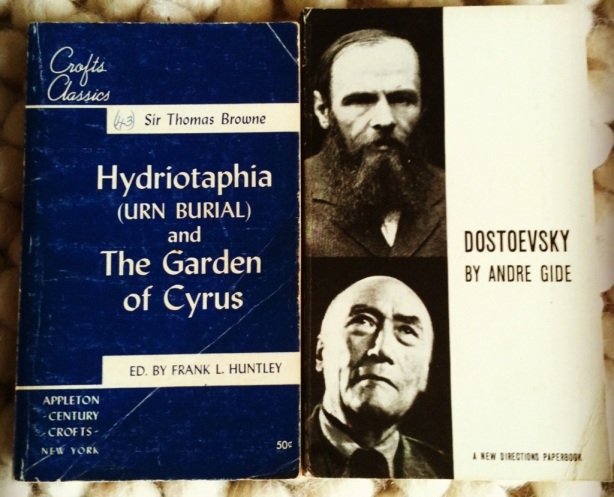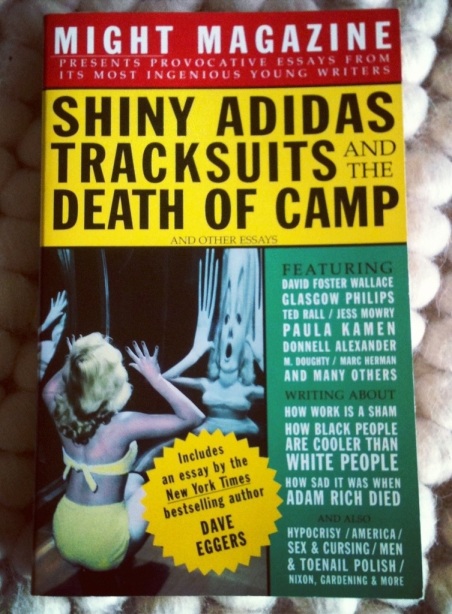
Needing more books like I need another hole in my head, I nevertheless visited my local bookshop (after an impressive three week abstinence period).
No, I haven’t read Thomas Browne’s Urn Burial yet. I’m a sucker for New Directions’ back stock, I just finished Crime & Punishment, and Gide’s book looks cool. Plus it was like a dollar.
I spied the Might Magazine collection—I knew Might as Dave Eggers’s first venture. I picked it up for the (very short) David Foster Wallace essay “Hail the Returning Dragon, Clothed in New Fire”—which, incidentally, doesn’t appear to be is collected in the forthcoming collection Both Flesh and Not under the new not-as-Game of Thronesish title “Back in New Fire.”


I know you’re fond of anonymity but I would love to know more of the biblioklept story…. how do you obtain so many wonderful tomes?
Is the clue in your blogger name?
LikeLike
Well, yes book shop… answers one of the questions. I wish I had disposable income.
LikeLike
I’m not really so anonymous . . . my name is Edwin Turner; I’ve signed it to every review the site has run (accept the ones written by guest reviewers) and it’s also there on the “About Us” page. Most of what runs on the site, including these “Books Acquired” posts, I attribute to simply Biblioklept.
As far as acquiring the books—
I live 1.2 miles from an enormous used bookstore that holds around 1.6 million books. I get lots of review copies that that bookstore turns into book credit.
LikeLike
Biblioklept:
I have a question: Whenever you get the time, could you do a post on how you go about writing your reviews? What is your process while reading the book? Do you take copious notes while reading, or do the reviews happen mostly from memory? How do you translate your reading into a meaningful review?
I am a philosophy major, and my time was spent reading shorter/denser works, taking the core ideas, and expanding those ideas into longer-form, argumentative papers. Writing reviews or interesting papers on entire works of fiction has been difficult for me, because it seems to go the opposite way, i.e., taking larger works filled with all sorts of diverse ideas and summarizing them into some sort of short, cogent review (that hopefully adds a bunch of related ideas in the process).
BTW, if this can be handled in the comment section here (rather than putting it up as a post on the site), that is fine with me as well.
LikeLike
Okay:
“What is your process while reading the book? Do you take copious notes while reading, or do the reviews happen mostly from memory?”
I dogear pages. If it’s an ebook, I highlight text. Then I go back and try to figure out what I saw on the page that interested me.
“How do you translate your reading into a meaningful review?”
I’m not sure if I always do translate my reading into a meaningful review.
I try to keep in mind that most books aren’t written for me. I try to keep the potential audience in mind. Still, I don’t try to hide or elide or omit my first-person perspective.
I try to follow John Updike’s rules because I like them:
https://biblioklept.org/2010/04/14/john-updikes-rules-for-reviewing-books/
I’ve written a bit more extensively on how/why I review books here, if you’re still interested:
https://biblioklept.org/2012/08/28/a-rambling-riff-on-the-age-of-the-amateur-book-review-ethics-and-adam-johnsons-the-orphan-masters-son/
Best,
Ed
LikeLike
I can think of a reason for non-inclusion of that DFW essay – it’s not very good. It effectively trivializes the suffering of people for the sake of some highly contrived thesis about how AIDS makes sex more exciting.
LikeLike
The DFW essay is included in Both Flesh and Not, btw. They’ve retitled for the collection “Back in New Fire.”
I think the thesis of the essay can easily be misinterpreted since it makes the claim that AIDS is a blessing of sorts.
LikeLike
Ah…thanks. If only Little, Brown were nicer about sending me review copies I wouldn’t make these terrible errors. Thanks. Matt.
LikeLike